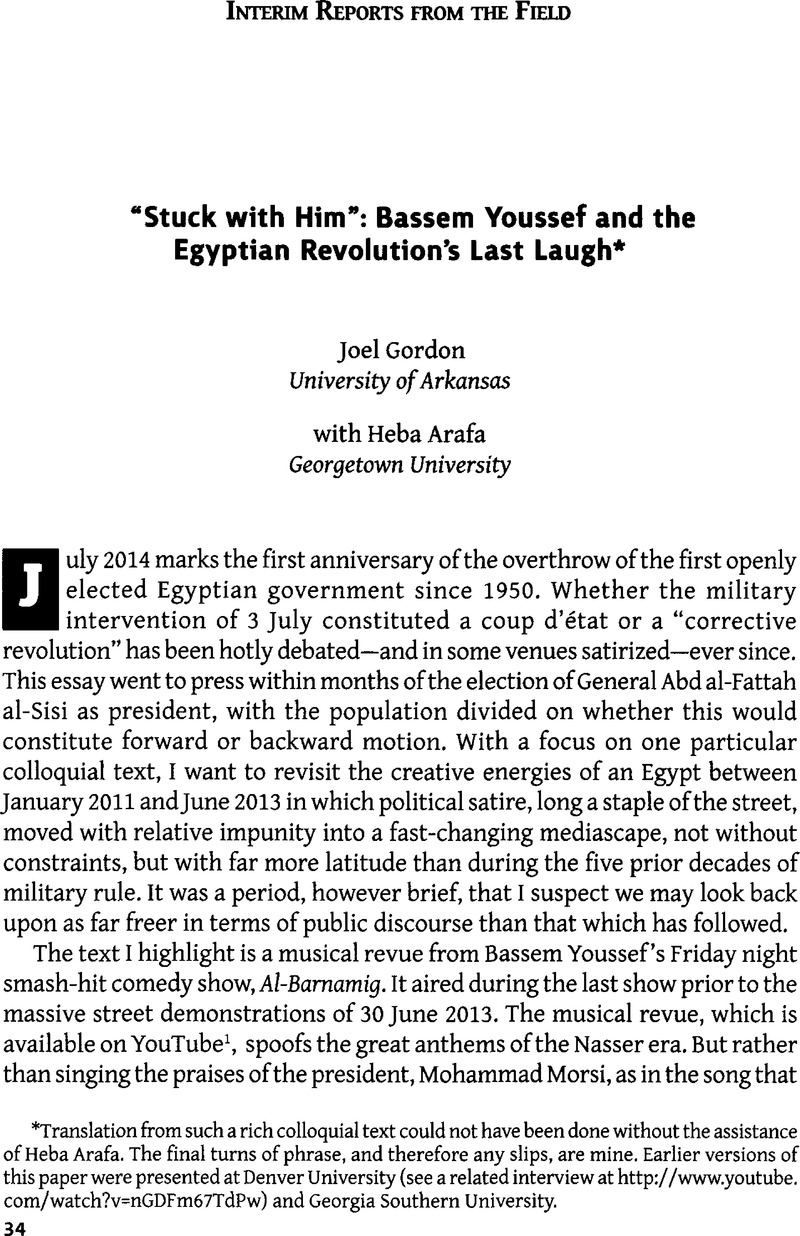Published online by Cambridge University Press: 09 March 2016

Translation from such a rich colloquial text could not have been done without the assistance of Heba Arafa. The final turns of phrase, and therefore any slips, are mine. Earlier versions of this paper were presented at Denver University (see a related interview at http://www.youtube.com/watch?v=nGDFm67TdPw) and Georgia Southern University.
4 See my essay, “Egypt’s Army and Brotherhood—Rereading History,” Today’s Zaman, 14 July 2013 (http://www.todayszaman.com/news-320677-egypts-army-and-brotherhood-rereading-history-by-joel-gordon-.html).
5 Bassem Youssef, “Egypt’s Secularists Repeating Islamists’ Mistakes,” CNN Opinion, 20 July 2013.
6 Memorandum from Board of Directors of CBC Network, 27 October 2013, displayed on air during an interview with Bassem Yousef by Yousry Foda on “Akhar Kalam” (ON TV), broadcast on 4 December 2013, https://www.youtube.com/watch?v=ecwlx5SajVU.
8 Not for all, however. See Alaa Al Aswany’s op-ed, “Egypt’s Ancient Snark,” The New York Times, 14 March 2014.
9 For example the recent viral Twitter hashtag intakhibū al-ars (elect the pimp) directed at Sisi.
10 Hamza Hendawi, “Egyptian Satirist Bassem Youssef Ends His TV Show,” Boston Globe, 2 June 2014, http://www.bostonglobe.com/news/world/2014/06/02/egyptian-satirist-bassem-youssef-ends-his-show/7tKEX0yMhjKFVsYcSyojgL/story.html.
11 Literally (as noted in the text): “We chose him and we took him.”
12 Literally, “We took the lemon and squeezed it.” The clear implication is that people knew they were getting an inferior product, but still opted to vote for Morsi (Hendawi 2014).
13 Il-āh has the double meaning of affirmation and a cry of pain.
14 Many believed, or were led to believe, that Morsi had worked for NASA in the United States. The implication is that “we bought into the lie.”
15 A reference to Morsi being the alternate candidate for the Freedom and Justice Party after Khayrat al-Shatir was disqualified due to electoral rules.
16 Ghūrū min hina means, for example, “Get out of my sight,” but with vulgar force.
17 Literally, his terminology, a classical/technical term satirizing Morsi’s idiosyncratic vocabulary, such as the two phrases that follow in the next line, translated as well as possible but originally in context that was considered strange.
18 This could be read as even more vulgar.
19 The implication is that “we chose to assert our right and it rebounded in our face.”
20 The Nahda (Renaissance) plan was Morsi’s electoral program.
21 A smack on the nape of the neck is a real insult, designed to provoke a fight or assert dominance.
22 Bimā yurḍī Allāh here connotes being treated fairly, in a way pleasing to God. Literally, “He became president in a manner pleasing to God,” another poke at Morsi’s Islamist affiliation.
23 More literally, “We said ‘Amen’ and fell into a trap!”
24 Gamaatuh, his crowd, is a play on the proper parlance for the original Muslim Brotherhood, which remains officially a social organization and which has since been outlawed. The implication is that while Morsi claimed that as candidate of the Freedom and Justice Party he would be president of all Egyptians, many feared he would represent more narrow interests of his base in the Brotherhood. Warāh (behind him) is a play on the chorus line of Ihna al-Sha‘b, Wa ihnā ikhtarnāk wa hanimshiviarāk, as noted in the text.
25 Gibnā ākhir implies pushing it to the highest gear. This last word, āh is drawn out for comic emphasis, even longer than prior occasions when Allāh was drawn out, spoofing religious chanting.